Politics
Political waves over sea level rise
By Tom McLaughlin, tmclaughlin@nwfdailynews.com
A deep political divide runs through American politics. It’s a gap stretching from a place where talk of sea level rise ends and conversation about climate change begins.While sea level rise is a subject most lawmakers are willing to at least touch upon, the topic of climate change is either ignored or ridiculed in many corners of Tallahassee and Washington.
“Sea level rise is more palatable,” said Susan Glickman, the Florida director of the Southern Alliance for Clean Energy. “That’s due in part to its undeniability.”
Long-time Republican strategist Mac Stipanovich, who splits his time between Tallahassee and Destin, lays climate change “denialism” squarely at the feet of the party he represents.
“Denying climate change has become a part of the right-wing Republican dogma, just like Second Amendment absolutism and lower taxes in all cases,” Stipanovich said.
If climate change is real, and manmade, Stipanovich said, it becomes “a huge serious problem” to be dealt with, and attempting to address the issue, either through carbon taxes, zoning restrictions or other means “would be politically unpopular.”
That, the strategist concluded, makes addressing climate change a low percentage play for Republicans. Implementing policies that will only make a small group of environmentally concerned activists happy “would be politically unpopular.”
“It’s now enshrined in Republican dogma to be a climate denier,” Stipanovich said. “And if we’ve learned anything recently, you can’t twitch a bit when it comes to the new right wing Republican dogma or you’re excommunicated.”
Florida Gov. Rick Scott has proven the equal to any Washington D.C. denialist. Arguably the state’s most famous Republican, the governor turned U.S. Senate candidate made national news in 2015 when he was credibly accused of preventing state employees from even uttering the words “climate change.”
Adam Putnam and Ron DeSantis, who are competing as Republicans to replace Scott in the governor’s mansion, appear poised to stay the conservative course where climate change and sea level rise are concerned. Neither Scott, Putnam nor DeSantis responded to several Gatehouse Media requests to complete a short sea level rise survey.
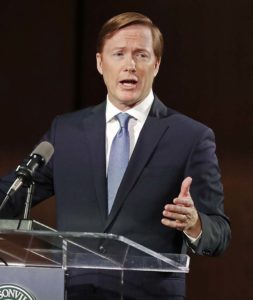
Putnam was the only Republican offered the survey who even responded to it with a statement.
“The threat of sea-levels rising presents a challenge to our beautiful beaches and booming tourism industry,” Putnam said. “This is an issue of focusing more efforts into investing in the infrastructure for Florida to be a strong, resilient state. We need to have beach re-nourishment, we need to support our estuaries, we need to invest in infrastructure that will harden our coastlines and allow us to move well fields inland.”
Asked to differentiate between sea level rise and climate change, a Putnam spokeswoman offered “we have no change to the statement as submitted.”
Long after the survey was sent, DeSantis, at a campaign stop in Englewood, did acknowledge that climate change “may be a factor” in creating an ongoing red tide crisis in the Gulf of Mexico in South Florida.
“I certainly wouldn’t rule out warmer waters having an impact; it seems reasonable,” DeSantis told Gatehouse Media’s Zac Anderson.
He termed climate change “more of a national and international issue” than one facing Floridians.
Tide gauge measurements at several points across Florida provide proof that not only are the world’s oceans rising, but that the pace with which they are doing so has accelerated since 2006. Studies consistently show the flooding is happening with more frequency.
This year flooding caused by high tides is anticipated to occur 60 percent more often in the United States than it did in 2000, according to a National Oceanic and Atmospheric Administration study.
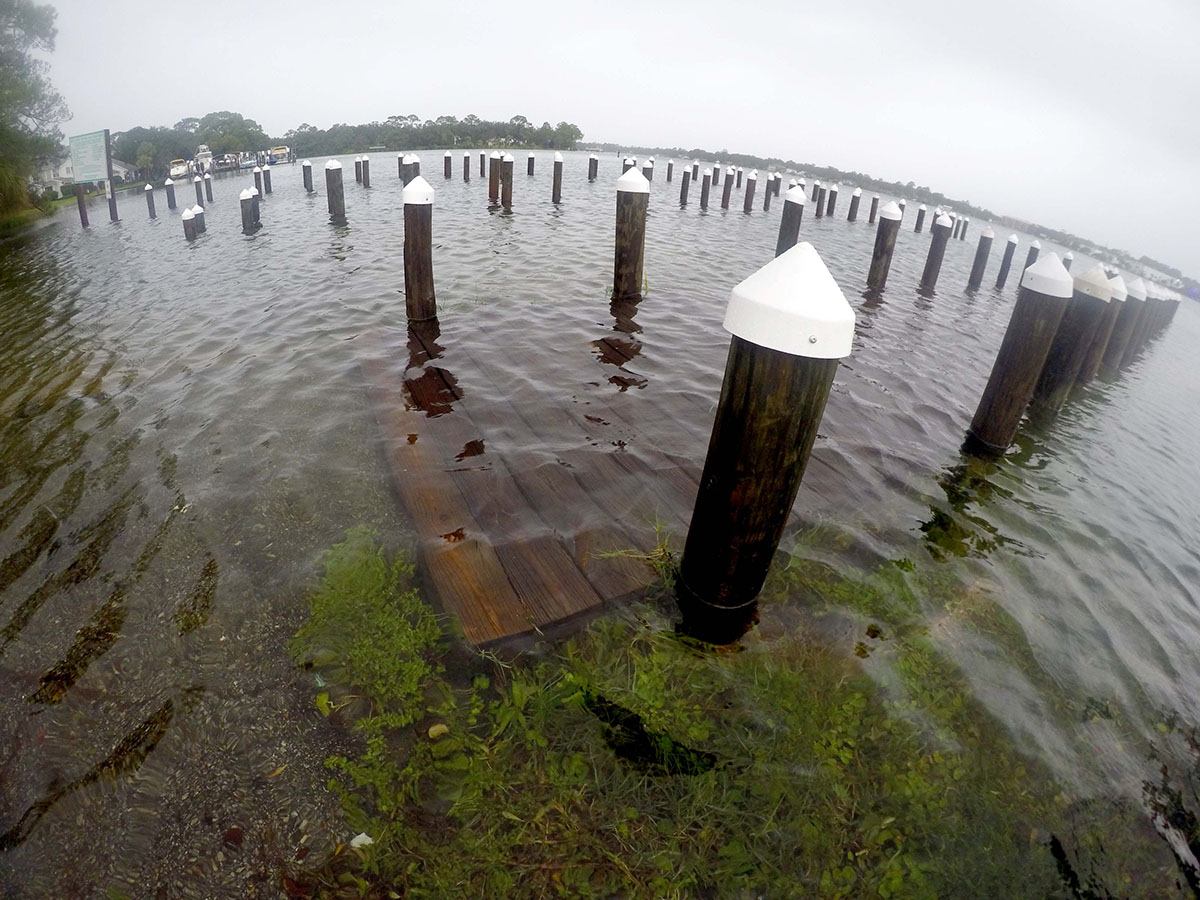
Glickman said sea levels can be expected to rise between six inches and 2.9 feet by 2050. Experts say that between 2005 and 2017, $7.4 billion has been lost in home value across 5 coastal states due to sea level rise, and Florida’s $5.4 billion in losses are the most of any state.
“No matter what we do now we’re looking at an impact,” she said during a recent conference call. “We need to be making long term decisions.”
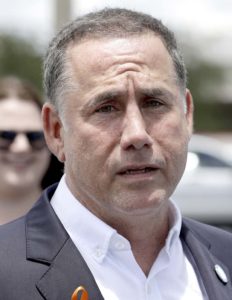
Phil Levine, one of five Democrats running this year for governor, became known as an advocate for steeling Florida against sea level rise when he was mayor of Miami Beach. Levine even boasts of having campaigned for that job from a kayak, paddling down the middle of a busy street inundated by flooding for which sea level rise was to blame.
“While some people get swept into office, I kind of got floated into office,” Levine likes to say.
Levine and two fellow Democratic gubernatorial candidates, Andrew Gillum and Chris King, provided lengthy answers to the Gatehouse Media survey questions about sea level rise.
Gubernatorial candidates Gwen Graham and Jeff Greene did not participate. U.S. Sen. Bill Nelson also declined to participate.
Levine used the survey to point out that hundreds of millions of dollars are being spent in Miami Beach to raise roads, install seawater pumps, improve building codes and erect sea walls to protect the city.
“The city has become a model for others around the world confronting climate change,” he said.
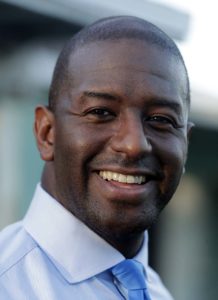
Gillum called for state-wide investments in infrastructure, the elimination of carbon emissions and coordination between local, regional and federal governments to find solutions to climate issues.
“I would direct all relevant state agencies to begin planning for sea level rise mitigation and adaptation, and to prevent further salt water intrusion,” he said. “And I would put scientists and science back in charge of our state’s climate change policies, not lobbyists.”
King said he has made environmental policy a cornerstone of his campaign.
“I have big, bold ideas for Florida on issues such as climate change, rising seas, Everglades’ restoration, clean water and air and building a clean energy economy,” he said in response to the Gatehouse Media survey.
Glickman and Rafe Pomerance, a former State Department official, contend that now is a crucial time to be talking about sea level rise and risking the leap to the scientifically linked proposition of climate change.
The Washington D.C. culture, though, has come to be exemplified by people like GOP Sen. James Inhofe, who, as chairman of the Senate Environment and Public Works Committee, once famously tossed a snowball onto the floor of the Senate and asked how snow could exist if the planet were warming.
Politics is hindering the country from moving forward on climate issues at a critical time in the nation’s history, Pomerance said.
“Congress is tied down fundamentally because of denialism,” he said. “This is holding us hostage to actually doing something about the issue.”
U.S. Rep Charlie Crist, a Democrat representing Florida’s 13th Congressional District, said unlike many others, Florida’s congressional delegation seems willing to see things differently when sea level rise and climate change are debated.
“Our delegation, they’re pretty moderate on the thing, for the most part. It’s hard to be a Floridian and not kinda get the environment thing,” Crist said.
Florida’s First Congressional District U.S. Rep. Matt Gaetz, of Fort Walton Beach, is as conservatively Republican as anyone in the House, but he’s also a member of the 84 member Climate Solutions Caucus.
“I don’t agree with some of the views some Democrats and even some Republicans have about the strategy to combat the problem, but I certainly can acknowledge that the earth is warming and humans make some contribution to that warming,” Gaetz said. “I see sea level rise as a consequence of climate change.”
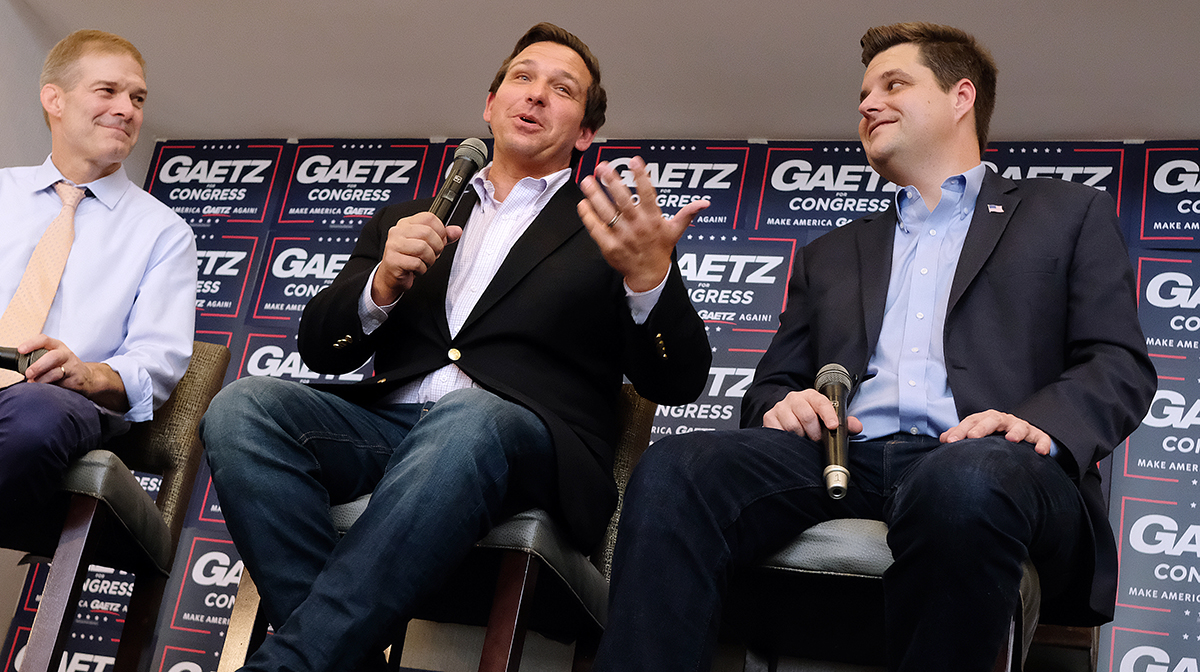
The sea level rise/climate change discussion is “far too driven by peoples’ partisan lens,” Gaetz said.
“I think Republicans and Democrats need to be able to look at the same data and come to the same scientific conclusion, and then we can disagree about what the best strategy is to deal with the problem,” he said. “I’ve been very disappointed that too many in Washington aren’t even willing to establish a common set of baseline facts.”
The Climate Solutions Caucus, Gaetz said, is a “Noah’s Ark” caucus, that only admits a member of one political party alongside a member of the other political party. He said he’s encouraged to see the 84-member caucus continuing to grow.
The Caucus was actually founded by Florida House members Carlos Curbelo, a Republican and Ted Deutch, a Democrat. Fellow Floridian Bill Posey, also a Republican, recently became the newest of the state delegation to become a Caucus member. Republicans Gaetz, Brian Mast and Ileana Ros-Lehtinen and Democrats Crist and Stephanie Murphy are members.
The Caucus has established three primary short term goals.
Its first is to bring Democrats and Republicans together to acknowledge the basic science behind sea level rise and climate change, Gaetz said.
“It’s hard to deny the clearance on bridges in Florida is changing,” Gaetz said. “That seems to be indicative of sea level rise.”
The second Climate Solutions Caucus objective is to educate House members about bad climate-oriented legislation.
“There are times in bills when someone will try to ban a review or study about the impacts of climate change,” he said. “Usually the Caucus sticks together to maintain an analysis of climate change in the other work that the Congress does.”

“I think the federal government is going to have a role in dealing with the consequences of climate change because many federal assets will be impacted by the affects of climate change, notably our military,” he said. “We cannot expect states to deal with the evolving territorial claims in the Arctic that are exacerbated in their complexity by climate change.”
The military and protecting the nation’s military assets from rising seas has continued to be a priority in Washington, even while other agencies, notably the Federal Department of Transportation and Environmental Protection Agency have slashed programs.
On Aug. 13, President Trump signed a defense authorization bill that includes a requirement that the military design and modify its buildings to better resist flooding, and calls for new military installations constructed in the 100-year flood plain be designed to withstand an additional two feet of flooding.
It also authorizes the U.S. Coast Guard to acquire six new ships capable of moving through sea ice, and calls upon the military to look into Chinese activity in the Arctic.
As with many other sea level rise or climate change-related issues, even the proposed military appropriations ran into resistance. Reps. Scott Perry (R-Pa.) and Ken Buck (R-Colo.) attempted to delete a requirement for a climate vulnerability study that had been added to the defense bill.
The amendment was defeated by 234-185, with the victory secured, at least in part, through the work of the Climate Solutions Caucus.
“It’s challenging, with the makeup of the body as it is, at present,” Crist said of moving climate-related legislation through Congress. “There’s an opportunity, though, this year, for things to change, at least in the House. If that occurs, maybe we can do a lot of good things.”

With primary elections fast approaching in this year’s governor’s race, and the U.S. Senate showdown between Nelson and Scott on the horizon in November, a coalition of environmental organizations on Aug. 15 released a study meant to advise competing candidates on the state’s gravest concerns.
Climate change is one of six issues specifically addressed in the document, called Trouble in Paradise.
“With approximately 75 percent of this state’s population in counties lining the coast, Florida must prepare for the increasingly severe weather and sea level rise caused by climate change,” the report states.
The study calls for Florida to reduce greenhouse gas emissions, invest in renewable energy, harden vulnerable infrastructure and steer development away from “areas vulnerable to the impact of severe weather,” Gatehouse Media’s Dale White reported.
It also calls for opposition to offshore drilling, the adoption of building codes the promotion of higher energy efficiency and expanded tax incentives for electric vehicles.
Pointing out the risks and economic impacts from flooding and higher storm surges, the report issues “a clarion call for leadership,” calling on the new governor to hire and appoint respected leaders who understand the myriad issues facing the state, the report said.
“Addressing community resilience and climate change in a proactive manner not only prepares this state for future challenges but also will result in more livable communities and long-term economic savings for taxpayers."
_____________
GateHouse Media reporter Dinah Voyles Pulver contributed to this report.